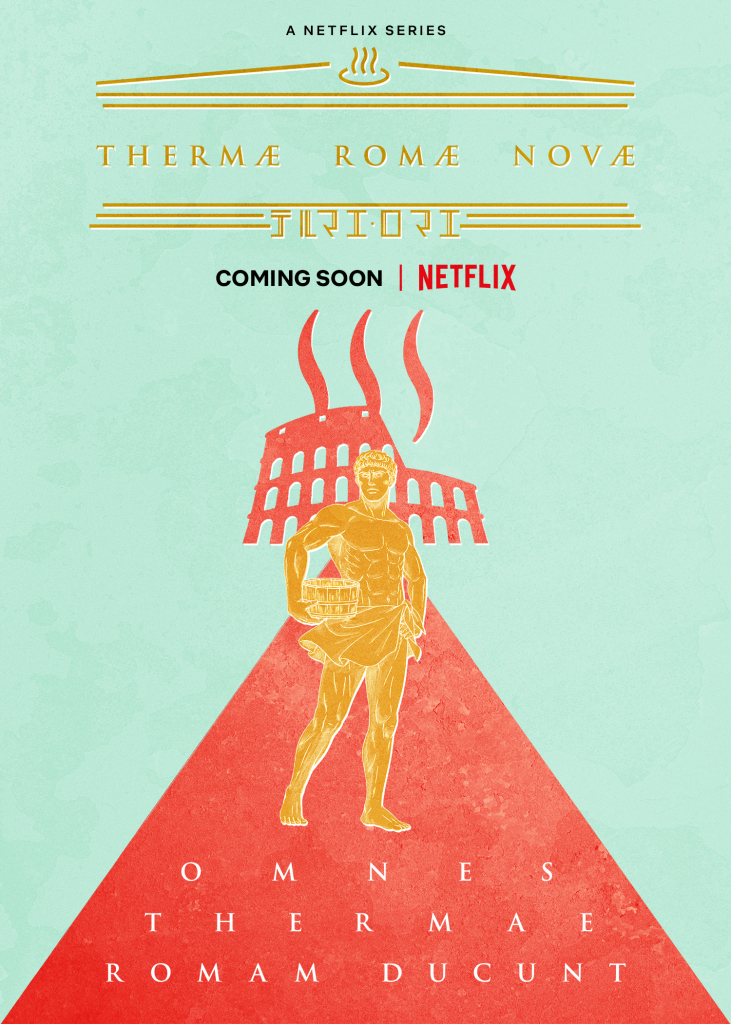English Dub Season Review: Thermae Romae Novae Season One
Overview (Spoilers Below):
A proud bath architect in Ancient Rome starts randomly surfacing in present-day Japan, where he’s inspired by the many bathing innovations he finds.
Our Take:
Netflix is still no stranger to providing a great lineup of anime content. Some of them turned out great. Others were also good. Netflix has proven itself that the streaming service is the best place to find anime content that you wouldn’t find on Funimation or even Crunchyroll.
The streak continues today with its latest anime adaptation that features time travel and plenty of naked people. The show is the newest adaptation of the manga series, Thermae Romae, written by Mari Yamazaki. It was previously translated into an anime series by DLE Inc. and director Azuma Tani in January 2012, followed by a live-action film three months later and its sequel in 2014. This new anime series for Netflix seeks to bring long-time fans back to the world of Thermae Romae and introduce newcomers like myself to its bizarre concept.
The overall season, consisting of 11 episodes, centers on Lucius Modestus (David Wald), a man in Ancient Rome who strives to become a great Thermae architect. Unfortunately, he struggles to come up with some brilliant ideas. One day, he discovers a tunnel underneath a spa that leads him to modern-day Japan, where he finds himself inspired by the modern bathing traditions and contraptions. Lucius then uses those findings to create his spa, Roma Thermae. Throughout the season, we see Lucius encountering a different task, getting swept up in present-day Japan, and finding the inspiration to solve the problem. The most notable examples are Lucius building an outdoor bath in episode three and making a private spa for Emperor Hadrianus (Richard Epcar).
The first episode sets the stage with a scrawny young Lucius discovering this time-jump passage for the first time. It then cuts to him as an adult who attempts to craft a better future for Rome regarding the bathhouses. Afterwards, the show displays an episodic formula with Lucius as a fish-out-of-water character who experiences modern traditions and bath-related inventions not seen in Ancient Rome, starting with the second episode. Its episodic structure can be pretty repetitive after a while, with no actual narrative to accompany Lucius’s time-traveling adventures, save for him serving as the Emperor’s designer and his marriage problems. However, there’s something about its formula that’s not only amusing but also surprisingly academic in its Roman and Japanese history. While a couple of elements felt rushed, especially in the last two episodes, the series is a good adaptation of the manga series.
Now, what do I mean when I say “academic”? The show includes a segment at the end of every episode where Mari Yamazaki experiences different parts of Japan’s hot springs culture inspired by a specific episode. This consists of the hot spring eggs in episode three and the inn in episode seven. So, you can say that it’s an adult animated show disguised as an educational program you’d see on the Discovery channel. I found this to be a welcoming approach, especially in anime aimed at teens and adults, because it provides a helpful learning tool for schools or colleges that teach Japanese history. You’ll be entertained by Lucius’s reactions toward modern Japan and learn some interesting facts about hot spring traditions. It’s a win-win scenario that doesn’t feel too reliant on one thing over the other.
The English voice cast was also pretty suitable in their roles. David Wald as Lucius has made me raise a few eyebrows regarding his vocal performance. While he did all right in some sequences, especially when he’s in Rome, his approach to exaggeratedly expressing specific dialogue came off as laughable at times. I wouldn’t say that it’s the worse piece of voice acting I’ve seen, but it isn’t something that I’ll remember fondly, unlike its clever concept. Richard Epcar from Bleach and Jojo’s Bizarre Adventure continues to provide solid voice work regarding his role as Emperor Hadrianus. Of course, video game fans will remember this actor as the voice of Raiden from Mortal Kombat and Ansem from Kingdom Hearts.
The animation provided by NAZ is also something that I admire. It’s highly detailed in its environments and designs, and it’s genuinely vibrant in its sequences, mainly when Lucius travels to Japan. It also features a few moments where the show combines 2D animation with CGI. It works in some parts, but there were also some moments where it looked cheap and out of place.
Overall, Thermae Romae Novae is as relaxing as sitting in a hot spring. As someone who isn’t familiar with the source material, I found this anime adaptation to be a genuinely entertaining arc that combines its time-travel comedy formula with its educational approach. Unfortunately, the season is filled with repetitive moments and rushed plot elements that almost ruined this unwinding experience. Despite that, its animation style, decent voice cast, and the “Hot Springs Tour” segments make this another watchable addition to Netflix’s long line of anime content.

Do we know if Hulu will be the only entity to have the dub, or if it will be on other platforms, too? The show in general is definitely going to be on multiple platforms.